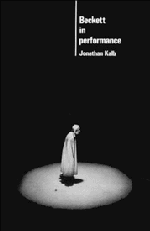Book contents
- Frontmatter
- Contents
- List of illustrations
- Acknowledgments
- 1 Introduction
- PART ONE Acting
- PART TWO Directing
- 5 Underground staging in perspective
- 6 Eh Joe, Dis Joe, He Joe: toward a television icon
- 7 The gamble of staging prose fiction
- 8 Conclusion: the question of context
- PART THREE Conversations
- Notes
- Bibliography
- Index
5 - Underground staging in perspective
Published online by Cambridge University Press: 01 June 2011
- Frontmatter
- Contents
- List of illustrations
- Acknowledgments
- 1 Introduction
- PART ONE Acting
- PART TWO Directing
- 5 Underground staging in perspective
- 6 Eh Joe, Dis Joe, He Joe: toward a television icon
- 7 The gamble of staging prose fiction
- 8 Conclusion: the question of context
- PART THREE Conversations
- Notes
- Bibliography
- Index
Summary
I detest this modern school of directing. To these directors the text is just a pretext for their own ingenuity.
(Samuel Beckett)“Don't all of [pause …] Samuel Beckett's plays have very elaborate and detailed stage directions?” one of my friendly neighborhood critics asked me the evening my latest Beckett trio opened in Washington.
“Yes, they [pause …] certainly do.”
“And those three heads stuck in those, uh, marvelous-looking urns?… That means that you didn't have to think about any actual movements?”
“That's, uh, right.”
“Well, excuse my asking, Alan, but what do you do?”
(Alan Schneider)To the extent that most acting problems are in some fashion also directing problems I have been dealing all along with the task of directing Beckett, at least with the part of it that relates to character development. As is well known, however, there is another side to directing involving the problematic exercise of interpretation, which does not primarily concern actors.
Even more than with other authors, the subject of directing Beckett is inextricably bound up with questions of faithfulness to text, mostly because this ordinarily reticent author has been extraordinarily vocal in his objections to faithlessness. Not entirely by accident, he had the good fortune of seeing many of his premieres staged by two paradigms of loyalty – Roger Blin and Alan Schneider – who not only adhered to the very specific instructions in his scripts but also made frequent public comments about the propriety of that strictness.
- Type
- Chapter
- Information
- Beckett in Performance , pp. 71 - 94Publisher: Cambridge University PressPrint publication year: 1989



